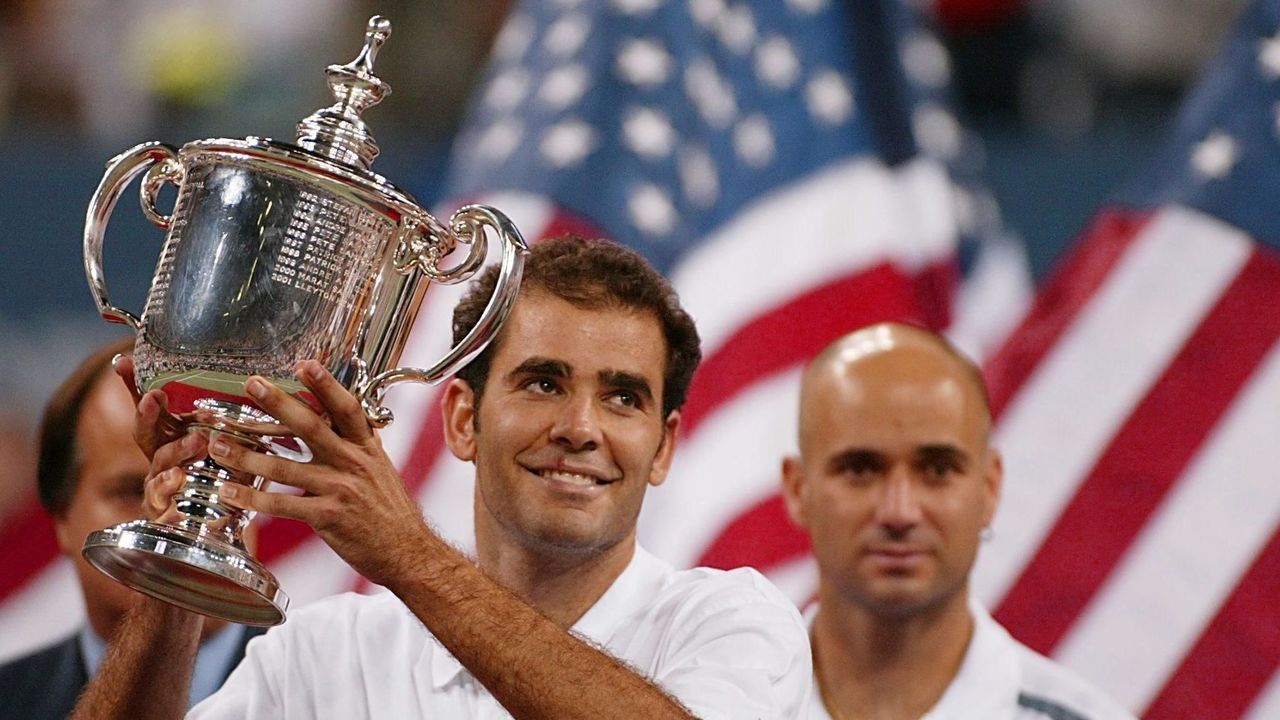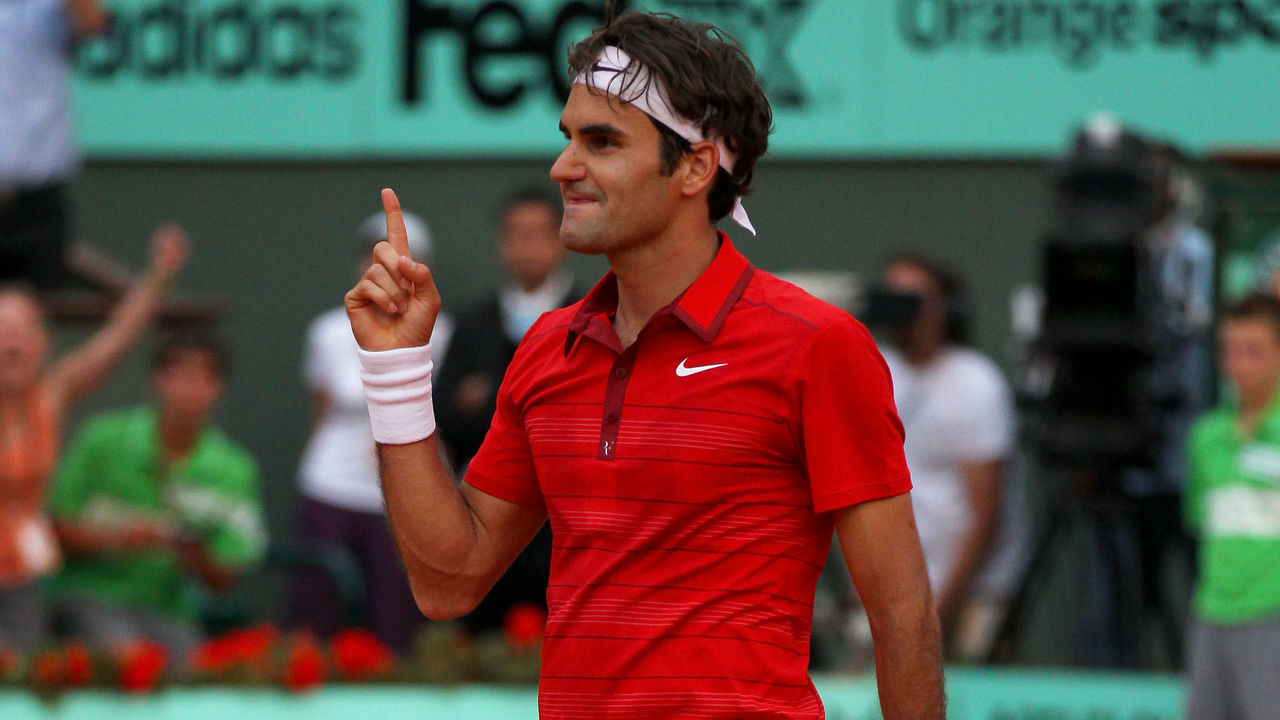5 tennis documentaries we'd love to see
With ESPN's "The Last Dance" whetting the appetite of folks desperate for any sort of sports content, theScore editors have joined forces to look back at some of the most captivating narratives that deserve similar treatment to Michael Jordan and the Chicago Bulls dynasty.
Previous editions of the series have examined documentary topics for hockey, basketball, golf, and college football. Today, we're looking at five tennis documentaries we'd love to see:
'Stranger than fiction'
If you haven't read "Open," Andre Agassi’s genre-defining autobiography, you probably have some time now. Do it immediately.
Agassi was an American prodigy, created by a demanding father and the Bollettieri tennis factory in Florida. A rapid ascent to the top was equaled only by a stunning fall that culminated in 1997. Agassi failed a drug test, which he later admitted was due to crystal meth use; he battled injuries, and saw his marriage to actress Brooke Shields disintegrate. Meanwhile, Agassi's ranking plummeted to No. 141 in the world.
The comeback was almost as remarkable as the fall.
Agassi worked his way from the bottom, competing in lower-tier events. He returned to the top 10 in 1998 and made history at the 1999 French Open. In the final, his opponent was Russian Andrei Medvedev. Agassi had provided his younger counterpart with advice a few weeks earlier in Monte Carlo and it was paying off - the tips might have been too good.
Down two sets, the heavens opened and Agassi, aided by the solace rain sometimes provides and a barrage of encouraging epithets from his coach Brad Gilbert, fought back. When it was over, Agassi completed the career Grand Slam with his first title on the Parisian clay. The women’s singles winner that year, Steffi Graf, later became Agassi’s wife. Sometimes, it’s just meant to be.
'Horror in Hamburg'
Monica Seles was on track to rewrite the tennis record book in April 1993. At 19, she had already won eight Grand Slam titles and held the upper hand in her rivalry with the German phenom Graf.
That rivalry spurred the delusions of an unstable Graf superfan named Gunter Parche, who stabbed Seles during a changeover at the Hamburg Open. "I remember sitting there, toweling off, and then I leaned forward to take a sip of water, our time was almost up and my mouth was dry. The cup had barely touched my lips when I felt a horrible pain in my back," wrote Seles in her autobiography, "Getting A Grip."
Parche only received a suspended sentence for his crime, but the impact of his actions was immeasurable. Seles stayed away from the sport for two years, time Graf spent consolidating her grip on the tour.
Seles’ story did not end there. The American returned to the pinnacle in 1996 when she captured the Australian Open. It was her ninth and final Grand Slam title but there was no getting around it - Seles was robbed of many more.
'You don't know Pete'
In summer 2002, even the most ardent Pete Sampras fan had to admit the obvious. The end was coming.
"Pistol Pete" had been dispatched by the unheralded George Bastl at his kingdom, Wimbledon, in the second round. Losses to Wayne Arthurs and Paul-Henri Mathieu followed. If the term was around at the time, "washed" would almost certainly have been used to describe Sampras’ state when he entered the 2002 US Open as the No. 17 seed.
Sampras was 31, an age considered ancient in tennis terms at the time. In search of a tonic that would prevent Father Time’s advances, Sampras brought coach Paul Annacone back into the fold.
In the third round, Sampras survived a five-set war with Brit Greg Rusedski, who claimed the American legend had lost multiple steps prior to their match. Sampras then demolished Tommy Haas and Andy Roddick, youngsters expected to take over with Pete on the decline.

Sampras had found something at the end of the Rusedski match, and rode it to the final where a familiar foe waited. Although Sampras was second-favorite, the script played out as it had so often when he met Agassi on the biggest stages. The 31-year-old captured his 14th and final Grand Slam title, proving everyone except himself wrong.
'The Indian Wells incident'
"King Richard," the Hollywood film set for release in 2021, will chronicle the rise of tennis superstars Serena and Venus Williams and their father.
While we’re excited to see Will Smith become Richard Williams, a docuseries on the Williams sisters when the sport they loved made it clear acceptance wouldn’t be forthcoming is a story that needs to be told.
The 2001 tournament at Indian Wells featured accusations of match-fixing leveled at the Williams sisters. "I mean, I don't know what Richard thinks about it. I think he will decide who's going to win tomorrow," said fellow pro Elena Dementieva prior to an all-Williams semifinal.
Venus drew ire for withdrawing from the tournament minutes before the semifinal was to begin due to injury and for not vigorously denying the allegations that her father pulled the strings.
Serena was heavily booed during her victory over Kim Clijsters in the final. Richard Williams believed the incident was racially motivated and the sisters did not return to Indian Wells for more than a decade.
'Three days in Paris'
When the Big Three are no longer playing competitively the memories will be limitless, but a specific moment in time worth featuring takes us back nine years to the 2011 French Open.
Novak Djokovic was on a remarkable run having won 41 matches to start the season, including the Australian Open in Melbourne. A Djokovic victory in Paris, the one place he hadn’t won, would indicate a tectonic shift in the power balance of the tour. Rafael Nadal was the defending champion looking to maintain his hold on the No.1 ranking; Roger Federer hadn't won a slam since the beginning of 2010 and looked ready to assume the mantle of third-best for the foreseeable future.
Djokovic met Federer in the semifinals, sitting one match away from facing Nadal in the final and tying John McEnroe’s record for opening a season undefeated. A finger wag at the end of an instant classic signaled Federer's unwillingness to surrender his keys to the sport's penthouse.

Nadal beat Federer in the final, but that season, the year of 2011, was all about Djokovic. He won 10 titles, three Grand Slams included, and put up a record of 70-6. The calendar Grand Slam was his if not for a seemingly random moment of brilliance from one of the game's GOATs.